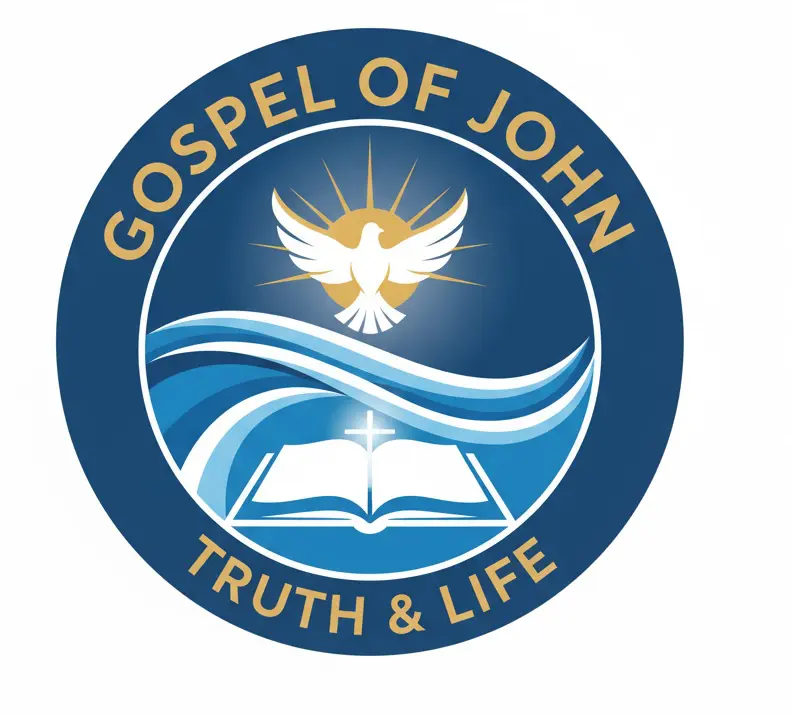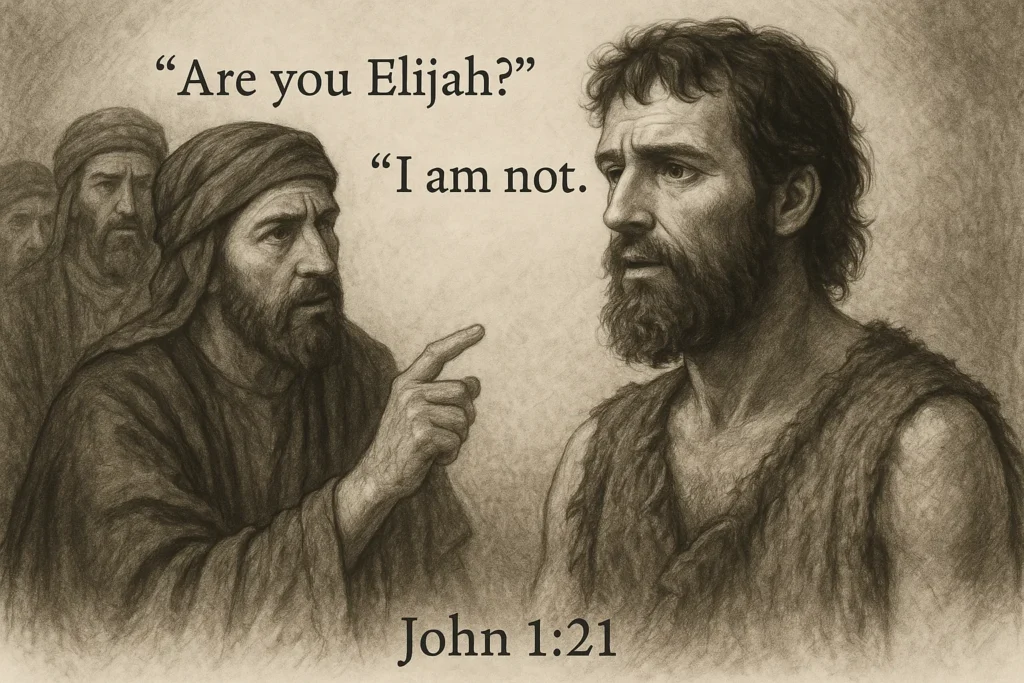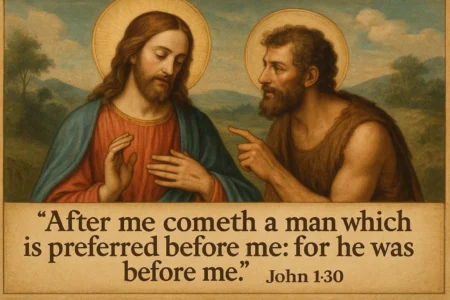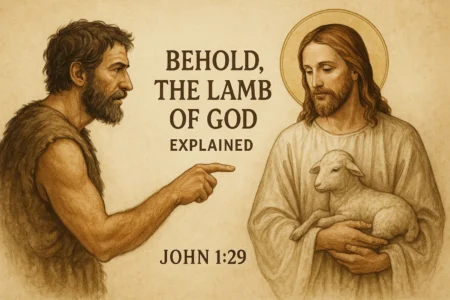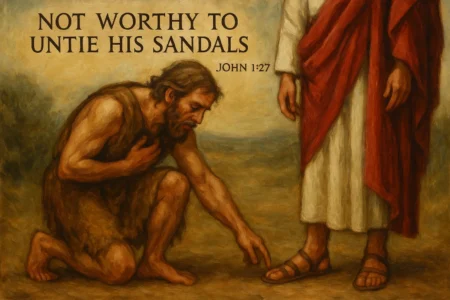It’s an exchange in the Gospels that just makes you stop and scratch your head.
You have these religious authorities, wound up tight with messianic expectation, marching from Jerusalem into the wild to check out this electrifying new preacher. They’ve got a clipboard. They need to put him in a box. “Are you the Christ?” He gives a short, sharp “I am not.”
So, they go to the next question, the one we’re here to talk about: “What then? Are you Elijah?”
And again, John the Baptist hits them with a flat ‘no.’ “I am not.”
This is a problem. A big one.
Why? Because Jesus, not much later, says the complete opposite. Talking about John, Jesus tells the crowd, “if you are willing to accept it, he is the Elijah who is to come” (Matthew 11:14).
So… what gives? Did John miss the memo on his own identity? Was Jesus stepping in to correct him? Or is there something much, much deeper going on? This single verse is a puzzle box. When we find the key to the John 1:21 meaning, it unlocks this incredible truth about God’s promises, our own broken expectations, and the jaw-dropping humility of the man God chose to roll out the red carpet for His Son.
To get it, we’ve got to get our hands dirty in the soil of first-century Jewish hope. We need to understand why they asked and why John’s answer was so brilliant.
More in John Chapter 1 Category
Key Takeaways
Before we dive deep, here’s the quick overview of what we’re about to uncover:
- John’s “No” Was Literal: The Jews were expecting the literal, physical return of the 9th-century BC prophet, Elijah of Tishbe. John was denying that he was this specific person back from the dead.
- The Expectation Came from Prophecy: This question wasn’t random. It was 100% based on a direct prophecy in Malachi 4:5, promising “Elijah the prophet” before the “great and awesome day of the LORD.”
- Jesus’ “Yes” Was Theological: Jesus affirmed John as Elijah in a functional sense. The angel Gabriel had already told John’s dad that his son would go “in the spirit and power of Elijah” (Luke 1:17).
- Humility Was John’s Mission: John’s “no” was an act of profound humility. By refusing the sensational title, he kept the spotlight off himself and pointed it squarely at the one he came to introduce: Jesus.
- The “John 1:21 Meaning” Is About Role, Not Title: John was not the man Elijah, but he perfectly fulfilled the role of Elijah. Both were tough wilderness prophets, both called for repentance, and both confronted corrupt rulers.
Why Were They Even Asking About Elijah?
That question didn’t just come out of nowhere. It wasn’t a wild guess. For them, it was the logical next question on their messianic flowchart.
You have to remember, these priests and Levites sent by the Pharisees weren’t there for a friendly chat. This was a formal interrogation. The whole nation was simmering. They were stuck under Rome’s thumb, and they were desperate for the Messiah—the Anointed One—to finally show up and restore Israel.
And according to their reading of Scripture, the Messiah’s arrival had a prerequisite. A warm-up act.
The final book of the Old Testament, Malachi, closes with a stunning promise. It’s the last word God speaks to His people for 400 years. A period of total prophetic silence. Can you imagine? Four centuries of waiting, with this one prophecy ringing in their ears.
So, what was that promise?
Didn’t Malachi Promise Elijah Would Come Back?
He sure did. Unambiguously. Malachi 4:5-6 (NIV) reads:
“See, I will send the prophet Elijah to you before that great and dreadful day of the LORD comes. He will turn the hearts of the parents to their children, and the hearts of the children to their parents; or else I will come and strike the land with total destruction.”
This one prophecy was absolutely seared into the national consciousness. And they took it 100% literally.
They weren’t just expecting someone like Elijah. No, they were scanning the horizon for Elijah himself. The very same guy. The prophet who called down fire on Mount Carmel, who got in the face of Ahab and Jezebel, and who—get this—was taken up to heaven in a fiery whirlwind without ever actually dying.
They believed he would physically drop from the sky to announce the Messiah and get the nation ready for judgment—that “great and dreadful day of the LORD.”
So when this wild man, John, explodes out of the wilderness—wearing camel’s hair and a leather belt (just like Elijah, see 2 Kings 1:8), eating locusts and honey, and preaching a fiery sermon of repentance—the entire nation snapped to attention. This guy looked like Elijah. He sounded like Elijah. He acted like Elijah.
They had to ask. “Are you him? Are you the guy?”
So, When John Says “I Am Not,” What’s He Really Denying?
This right here. This is the absolute heart of the John 1:21 meaning.
John isn’t denying his mission. He’s denying their label.
When that delegation from Jerusalem asks, “Are you Elijah?” their subtext is, “Are you the actual, literal prophet Elijah of Tishbe, zapped back to earth from heaven?”
And to that specific question, the only truthful answer was “No.”
He wasn’t a reincarnation. He wasn’t some 900-year-old prophet walking around. He was John. Just John, son of Zechariah.
I’ve had my own, albeit much smaller, taste of this. I remember when I first started leading a small group at my church. I was young, full of energy, and maybe a little too intense. An older member pulled me aside one day and said, “You remind me so much of Pastor Thompson from the 80s. Are you trying to be the next him?”
It was meant as a compliment, but it felt like a trap. Pastor Thompson was a legend, but I wasn’t him. I had to smile and say, “No, sir. I’m just John.” I had to deny the label, not because I disrespected the man, but because my job was to be me, not a copy of someone else.
John the Baptist was doing the exact same thing, just on a cosmic scale. He was rejecting their box. He was refusing their miscast role. He knew exactly who he was, and “Elijah” wasn’t his name. His “no” was a statement of profound, literal, and humble truth.
But then, Jesus throws a wrench in the whole thing.
But Wait… Didn’t Jesus Say John Was Elijah?
And this is the part where the critics love to pounce. “See! A flat-out contradiction!” they’ll say.
Well, let’s look at the evidence. After John gets thrown in prison, he sends his own disciples to ask Jesus, “Are you the one who is to come, or should we expect someone else?” (Matthew 11:3). After Jesus responds, He turns to the crowd and gives this incredible testimony about John.
He wraps it up with this bombshell in Matthew 11:13-14 (NIV):
“For all the Prophets and the Law prophesied until John. And if you are willing to accept it, he is the Elijah who is to come.”
He doesn’t mince words at all. He says it again, even more clearly, after the Transfiguration. The disciples, having just seen the actual Elijah talking with Jesus, are (you can imagine) pretty confused. They ask in Matthew 17:10, “Why then do the teachers of the law say that Elijah must come first?”
Jesus’ reply is a masterclass. He first confirms their theology: “To be sure, Elijah comes and will restore all things.” But then He adds, “But I tell you, Elijah has already come, and they did not recognize him… Then the disciples understood that he was talking to them about John the Baptist” (Matthew 17:12-13).
So, we’re left with this: John says, “I am not Elijah.” Jesus says, “He is Elijah.”
How can they both possibly be right?
How Do We Solve This “Elijah Paradox”?
The key that unlocks this whole “paradox” isn’t even in John or Matthew. It’s in Luke.
We have to hit rewind and go back to the moment before John was even born. His father, the priest Zechariah, was serving in the temple when the angel Gabriel shows up. Gabriel delivers an impossible promise: Zechariah’s elderly, barren wife would have a son.
And then Gabriel defined that son’s mission. Pay very close attention to his words in Luke 1:17 (NIV):
“And he [John] will go on before the Lord, in the spirit and power of Elijah, to turn the hearts of the parents to their children and the hearts of the children to their parents—to make ready a people prepared for the Lord.”
And boom. There it is. The answer was given before the question was ever asked.
John was not Elijah in person. He was Elijah in function.
He was not the body of Elijah, but he was the spirit of Elijah. Jesus, speaking from his divine, theological perspective, was affirming John’s role. John, speaking from his human, literal perspective, was denying the label.
Both of them were 100% correct.
What Does “In the Spirit and Power of Elijah” Actually Mean?
That phrase from Gabriel? It’s surgically precise. It slices the comparison into two perfect parts that nail John’s ministry.
1. The “Spirit” of Elijah: You can think of this as the character and the anointing. It’s that same fiery zeal, that same uncompromising courage, that same divine calling. Elijah was a man of the wilderness, totally set apart from the corrupt religious and political systems. So was John. Elijah was utterly devoted to God’s covenant. So was John. Elijah’s message wasn’t one of warm fuzzies; it was a message of sharp, urgent confrontation. So was John’s.
2. The “Power” of Elijah: This refers to the function and the effect. What was Elijah’s great mission? He was the prophet of “turning.” He called for a national turning from the idol Baal back to the one true God, Yahweh.
And what did Malachi 4:6 prophesy? That Elijah would “turn the hearts” of the people. And what did Gabriel promise? That John would “turn the hearts” of the parents and children.
John’s entire ministry was a national call to turn. The word he screamed from the riverbanks was “Repent!” (in Greek, metanoia), which literally means to “change your mind” or “turn around.” He was fulfilling the precise function of Elijah: getting a people ready for the Lord by calling them to turn back to God.
- Elijah confronted the corrupt King Ahab and Queen Jezebel.
- John confronted the corrupt King Herod and Queen Herodias.
The parallel is perfect. John was the 1st-century fulfillment of the Elijah-type.
Why Wouldn’t John Just Say, “I’m the New Elijah”?
This, for me, is the most beautiful part of the whole story. It gets right to the core of who John was.
Look, he could have played their game. He could have said, “Yes, but not in the way you think.” He could have claimed the title. He was, at that moment, the most famous man in Judea. Crowds were flocking to him. He had a massive platform.
If he had said “Yes, I am Elijah,” he would have sparked a political and religious blaze. The focus would have instantly snapped right onto him. The whole debate would be “Is he really Elijah? What does this mean? Is he the one?”
John refused.
His entire mission, his entire identity, was to be a signpost, not the destination. His whole purpose in life was to get people to look past him.
He famously says in John 3:30, “He [Jesus] must increase, but I must decrease.”
Claiming the title “Elijah” would have made John increase. It would have fed the celebrity machine, the personality cult. And so, he gave the only answer a truly, profoundly humble man could give. “I am not.”
I once worked on a major project where my team leader did all the heavy lifting. I mean, the man was brilliant. When the time came to present to the executives, the CEO looked at my boss and said, “This is incredible. This is your victory.”
And I’ll never forget what my boss did. He stepped back and said, “Thank you, but the victory belongs to the team that built it and the product we’re serving. I was just the guy clearing the path.”
He was the leader, but he refused the title of “victor” because he knew it would put the spotlight in the wrong place. It would have been about him, not the work.
That is John the Baptist. His “no” to being Elijah was the ultimate act of “decreasing.” He refused to be the story. He insisted he was only the herald.
What Else Did They Ask Him? And What Do Those Answers Tell Us?
But the “Elijah” question wasn’t the only one on their list. That full exchange in John 1:19-23 is a total rapid-fire interrogation.
- “Who are you?” He confesses, “I am not the Christ.” (The Messiah)
- “What then? Are you Elijah?” He says, “I am not.”
- “Are you the Prophet?” He answers, “No.”
This third question is just as significant. “The Prophet” refers to a figure promised by Moses in Deuteronomy 18:15, a “prophet like me” whom God would raise up. By John’s day, this figure was sometimes seen as the Messiah, sometimes as another forerunner.
John denies this title, too.
He gives them “no” for Christ. “No” for Elijah. “No” for the Prophet.
You can almost feel the delegation getting exasperated. They finally just say, “Who are you? Give us an answer to take back to those who sent us. What do you say about yourself?” (John 1:22).
Only then, after rejecting every sensational label they try to pin on him, does John give his true identity.
If He’s Not Elijah and Not the Prophet, Who is John the Baptist?
His answer is one of the most magnificent definitions of a life’s purpose you’ll find anywhere in Scripture.
Quoting Isaiah 40:3, John says:
“I am the voice of one crying out in the wilderness, ‘Make straight the way of the Lord.'” (John 1:23)
Just stop and think about that. He doesn’t define himself as a person. He’s a voice.
A voice isn’t the thing itself; it just carries the message. A voice is temporary; the word it speaks is what endures. A voice is just a means to an end.
John’s identity wasn’t a title he needed to claim. It was a task he needed to complete. He was the forerunner. The path-clearer. The announcer. His entire “self” was wrapped up in his relationship to the One he was announcing.
His “no” to their questions was a massive “yes” to his true calling. He was not the star of the show. He was the advance man, checking the mic and telling the crowd the headliner was on his way. This profound understanding of his mission is why Jesus would later say, “among those born of women there has not risen anyone greater than John the Baptist” (Matthew 11:11).
What Can We Learn from John’s “No”?
The meaning of John 1:21 isn’t just for some dusty theology book. It’s got a razor-sharp application for us, right here, right now.
We live in a world that is obsessed with labels. With titles. With personal brands. People are always asking, “Who are you?” and they expect an answer like a job title, a follower count, or a list of things you’ve done.
John’s “no” just cuts right through all that. It’s a powerfully counter-cultural statement.
- It’s a “no” to ego. John refused to let his mission become about him. He shows us that the greatest calling is not to be someone, but to do something for someone greater.
- It’s a “no” to human expectations. The crowds wanted him to be Elijah. It would have been an amazing story. But John was more committed to the truth than to the narrative. He chose to be faithful to his specific, less-glamorous-sounding role as a “voice.”
- It’s a “yes” to a higher purpose. His identity wasn’t found in what people called him, but in what God called him to do. He knew who he was because he knew whose he was and why he was sent.
What’s the “John 1:21 Meaning” for Us Today?
So, when we circle all the way back to our original question, the John 1:21 meaning becomes beautifully clear. It’s a masterclass in how to read the Bible and what real humility looks like.
It teaches us that God fulfills His promises, but He often does it in ways that are far more complex and profound than our little literal-minded checklists can handle. The Jews were looking for a person; God sent a purpose. They were looking for a returning prophet; God sent a new prophet in the spirit of the old one.
This concept, where an Old Testament person or event serves as a pattern (or “type”) for a New Testament fulfillment, is a key part of how the Bible tells its story. As noted in a scholarly article from Liberty University’s digital commons, the relationship between Elijah and John is a classic example of this “typology,” showing a clear “continuity and fulfillment” in God’s redemptive plan.
John’s “no” forces the questioners, and us, to stop looking for the sensational and start listening for the substance.
So, Was John Confused About His Own Identity?
Not a chance. Absolutely not.
John was maybe the least confused man in the entire New Testament.
He knew with crystal clarity that he was not the light, but was sent to “bear witness of the light” (John 1:8).
His “no” and Jesus’ “yes” aren’t a contradiction. They’re two sides of the very same coin, a perfect harmony of literal truth and theological fulfillment.
- John’s Perspective (Literal): “Am I the actual person named Elijah who lived centuries ago and was taken up in a chariot? No. I am not.”
- Jesus’ Perspective (Theological): “Did John perfectly fulfill the prophetic role of Elijah, coming in his ‘spirit and power’ to prepare the way for the Messiah? Yes. He is the man Malachi promised.”
Both statements are true. You just have to know which question is being answered.
Why Does This Single Verse Still Matter So Much?
Because it’s a gateway.
Get this one verse, and it unlocks the entire framework of John’s ministry and his whole relationship with Jesus.
It shows us that God always keeps His promises, but He often does it in ways that completely shatter our small-minded expectations. We look for a political king; He sends a suffering servant. We look for a returning celebrity prophet; He sends a humble voice out in the desert.
John’s “no” is a direct challenge to every one of us.
- It teaches us to hold our expectations loosely.
- It forces us to listen past the labels and look for the heart of the message.
- It models a life of radical humility, where our greatest success is making someone else look good.
John the Baptist, by saying “I am not,” did his job perfectly. He forced the world to stop looking at him and to turn its head toward the carpenter from Nazareth walking toward the Jordan River.
And in doing so, he gave the most powerful “yes” of his life—a “yes” to his mission, a “yes” to his God, and a “yes” to the coming King.
FAQ
Why did the Jewish authorities ask Jesus if John was Elijah, and how does the Bible interpret this question?
The Jewish authorities asked because based on prophecy in Malachi 4:5, they expected Elijah to return before the Messiah’s arrival. Jesus affirmed that John fulfilled the role of Elijah in terms of spirit and mission, even though John explicitly denied being Elijah in person.
How can John both deny being Elijah and Jesus affirm that he is Elijah?
John denies being Elijah in literal terms, meaning he is not the actual, historical Elijah returned from heaven. Jesus affirms he fulfills Elijah’s role in function and spirit, meaning he embodies Elijah’s mission and character, fulfilling Old Testament prophecy in a symbolic and functional sense.
What does ‘in the spirit and power of Elijah’ mean in the biblical context?
‘In the spirit and power of Elijah’ refers to John the Baptist having the character, divine calling, and mission similar to Elijah, specifically calling for repentance and preparing people for the Lord, even though he is not the literal Elijah himself.
What is the main lesson we can learn from John’s ‘No’ and his role as a humble forerunner?
The main lesson is that humility and focus on God’s calling are essential; we should avoid labels and recognition that distract from our true purpose. Instead, we should humbly serve, pointing others towards Christ, fulfilling God’s plan without seeking personal glory.
